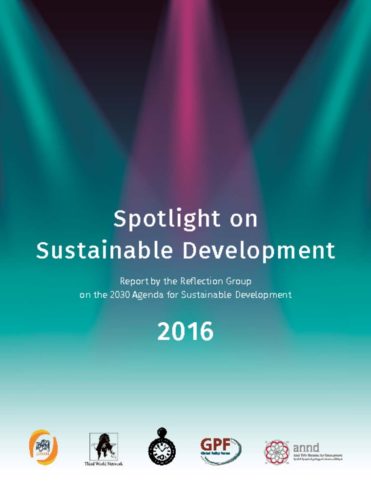PUBLICATION

Spotlight 2030: SDG 7 – Ensure access to affordable, reliable, sustainable and modern energy for all
Chapter contribution to the book "Spotlight 2030" with civil society reflections on each of the 17 SDGs. This article covers SDG 7 on Enegy and outlines a vision for people-centered renewable energy as driver for both energy access and climate solutions, and shows how energy plays a key role for the achievement of essentially all other SDGs.More info/Summary
This article outlines the vision for a new energy model based on renewables and with new forms of people-centered, decentralised and distributed forms of ownership. It discusses how this transformation can be undertaken, and how energy access, development and sufficiency are deeply inter-related.
The article argues that “Experiences from around the world show that local energy solutions where people are involved in energy production are much more sustainable, gain wide acceptance by local populations, and generate a vast number of development co-benefits”.
As the world embarks on a renewable energy revolu- tion, it is imperative that this process is undertaken with precaution, safeguards and genuine participa- tion by civil society, policy-makers and individuals as well as a socially responsible renewable energy sector. Only through people-centred planning, deci- sion-making and implementation processes will the renewable energy transformation succeed.
The full book ‘Spotlight 2030’ can be downloaded here.
Table of content:
1.1 The 2030 Agenda –
a new start towards global sustainability? By Jens Martens on behalf of the Reflection Group on the 2030 Agenda for Sustainable Development
1.2 Reports from the bottom up:
“The road is hazy and full of obstacles” By Roberto Bissio, Social Watch Spotlights on the SDGs
2.1 The new goal on poverty: A welcome paradigm shift By Roberto Bissio, Social Watch
2.2 Towards the transformation
of our agricultural and food systems By Lim Li Ching, Third World Network
2.3 The “Health SDG”:
Some progress, but critical concerns remain By Development Alternatives with Women for a New Era (DAWN)
2.4 Access to quality education, the new paradigm By Jorge Osorio-Vargas, Professor at the Escuela de Psicología, Universidad de Valparaíso (Chile)
2.5 Overcoming Global Structural Obstacles and Preventing Negative Spill-over Effects for Realizing Women’s Human Rights By Development Alternatives with Women for a New Era (DAWN)
2.6 Whose rights to water will the 2030 Agenda promote? By Meera Karunananthan, Council of Canadians, in collaboration with Devin Tellatin and the NGO Mining Working Group
2.7 Energy at a crossroad By Niclas Hällström, What Next Forum
2.8 Decent work for all by 2030: taking on the private sector By Matt Simonds with substantial inputs from Paola Simonetti, Yorgos Altintzis, and Theo Morrissey, ITUC
2.9 Industrialization, infrastructure and clean technology: at the heart of structural transformation but blocked by binding constraints in the international free trade regime By Bhumika Muchhala, Third World Network
2.10 Will inequality get left behind in the 2030 Agenda? By Kate Donald, Center for Economic and Social Rights (CESR)
2.11 Towards a New Urban Agenda By Daria Cibrario, Public Services International
2.12 Corporate capture subverts
production and consumption transformation By Chee Yoke Ling, Third World Network
2.13 The climate change battle in Paris: putting equity into action 101By Meenakshi Raman and Chee Yoke Ling, Third World Network
2.14 Policy choices for helping or hindering the poor By Christine von Weizsäcker, Ecoropa
2.15 “There can be no sustainable development without
peace and no peace without sustainable development” By Robert Zuber, Global Action to Prevent War
2.16 Beyond the current means of implementation By Stefano Prato, Society for International Development
2.17 International Trade and the 2030 Agenda for Sustainable Development By Ranja Sengupta, Third World Network
3.1 Measuring Accountability: The politics of indicators By Barbara Adams, Roberto Bissio and Karen Judd
3.2 Towards a 2030 Agenda Dashboard By Roberto Bissio, Social Watch

